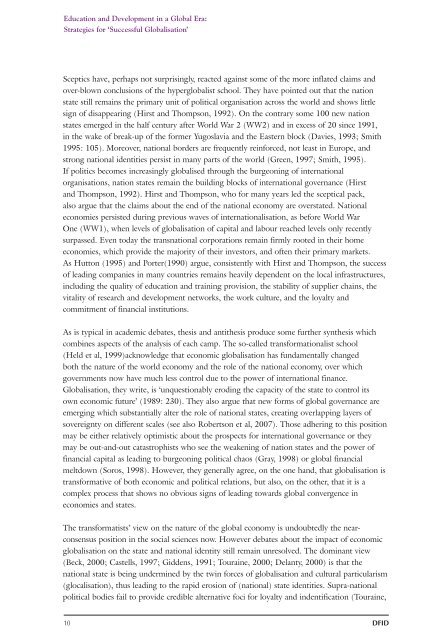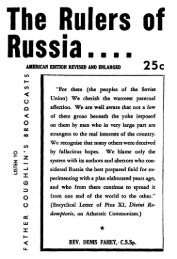education-dev-global-era-69
education-dev-global-era-69
education-dev-global-era-69
Create successful ePaper yourself
Turn your PDF publications into a flip-book with our unique Google optimized e-Paper software.
Education and Development in a Global Era:Strategies for ‘Successful Globalisation’Sceptics have, perhaps not surprisingly, reacted against some of the more inflated claims andover-blown conclusions of the hyper<strong>global</strong>ist school. They have pointed out that the nationstate still remains the primary unit of political organisation across the world and shows littlesign of disappearing (Hirst and Thompson, 1992). On the contrary some 100 new nationstates emerged in the half century after World War 2 (WW2) and in excess of 20 since 1991,in the wake of break-up of the former Yugoslavia and the Eastern block (Davies, 1993; Smith1995: 105). Moreover, national borders are frequently reinforced, not least in Europe, andstrong national identities persist in many parts of the world (Green, 1997; Smith, 1995).If politics becomes increasingly <strong>global</strong>ised through the burgeoning of internationalorganisations, nation states remain the building blocks of international governance (Hirstand Thompson, 1992). Hirst and Thompson, who for many years led the sceptical pack,also argue that the claims about the end of the national economy are overstated. Nationaleconomies persisted during previous waves of internationalisation, as before World WarOne (WW1), when levels of <strong>global</strong>isation of capital and labour reached levels only recentlysurpassed. Even today the transnational corporations remain firmly rooted in their homeeconomies, which provide the majority of their investors, and often their primary markets.As Hutton (1995) and Porter(1990) argue, consistently with Hirst and Thompson, the successof leading companies in many countries remains heavily dependent on the local infrastructures,including the quality of <strong>education</strong> and training provision, the stability of supplier chains, thevitality of research and <strong>dev</strong>elopment networks, the work culture, and the loyalty andcommitment of financial institutions.As is typical in academic debates, thesis and antithesis produce some further synthesis whichcombines aspects of the analysis of each camp. The so-called transformationalist school(Held et al, 1999)acknowledge that economic <strong>global</strong>isation has fundamentally changedboth the nature of the world economy and the role of the national economy, over whichgovernments now have much less control due to the power of international finance.Globalisation, they write, is ‘unquestionably eroding the capacity of the state to control itsown economic future’ (1989: 230). They also argue that new forms of <strong>global</strong> governance areemerging which substantially alter the role of national states, creating overlapping layers ofsovereignty on different scales (see also Robertson et al, 2007). Those adhering to this positionmay be either relatively optimistic about the prospects for international governance or theymay be out-and-out catastrophists who see the weakening of nation states and the power offinancial capital as leading to burgeoning political chaos (Gray, 1998) or <strong>global</strong> financialmeltdown (Soros, 1998). However, they gen<strong>era</strong>lly agree, on the one hand, that <strong>global</strong>isation istransformative of both economic and political relations, but also, on the other, that it is acomplex process that shows no obvious signs of leading towards <strong>global</strong> convergence ineconomies and states.The transformatists’ view on the nature of the <strong>global</strong> economy is undoubtedly the nearconsensusposition in the social sciences now. However debates about the impact of economic<strong>global</strong>isation on the state and national identity still remain unresolved. The dominant view(Beck, 2000; Castells, 1997; Giddens, 1991; Touraine, 2000; Delanty, 2000) is that thenational state is being undermined by the twin forces of <strong>global</strong>isation and cultural particularism(glocalisation), thus leading to the rapid erosion of (national) state identities. Supra-nationalpolitical bodies fail to provide credible alternative foci for loyalty and indentification (Touraine,10 DFID





